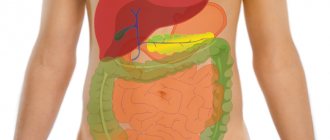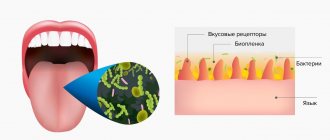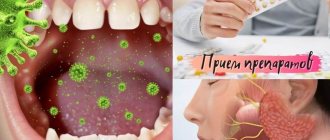The appearance of an unpleasant odor from the mouth, medically called “halitosis,” is a signal of trouble in the growing organism. Kaliningrad residents can notice this symptom when communicating with a child, laughing or kissing.
In most cases, odor occurs due to poor hygiene, which disrupts the balance of microflora in the mouth and increases the number of pathogenic microorganisms. During the decomposition of bacteria, compounds of hydrogen sulfide and nitrogen are formed, which are exhaled along with the air.
In this situation, the problem can be solved with the help of hygiene and does not pose any danger to the child’s health. However, there may be other reasons for the appearance of a specific odor from the mouth. In what cases should parents be wary - we will find out further...
Risk factors affecting fresh breath
Let's start by identifying the reasons that negatively affect healthy breathing. At the same time, we note that microflora imbalance can occur even in healthy children. This happens for a number of reasons:
- failure to comply with hygiene rules, as we have already outlined;
- dry mouth due to insufficient saliva;
- insufficient water and fluid intake;
- breathing through the mouth, out of habit or due to nasal congestion;
- oral infections (untreated caries, gum disease, etc.);
- consumption of foods with a pungent odor (garlic, onions) or those that provoke fermentation (legumes, grapes);
- taking medications;
- hormonal imbalance;
- smoking (relevant for teenagers).
Thus, in most cases, the cause of bad breath is problems in the oral cavity, infections and poor diet.
Intestinal infections
In a newborn, diarrhea is a sign of dysbiosis
Intestinal infections are caused by an imbalance of opportunistic flora and damage by pathogenic bacteria. Diseases of this kind are contact diseases. Therefore, parents need to comply with all hygiene standards for themselves and their baby.
Signs of intestinal infection:
- loose, frequent stools;
- the presence of a large amount of mucus in the stool, pieces of undigested food, and in severe cases - blood;
- abdominal pain - the baby screams and pulls his legs towards his tummy;
- anxiety;
- there may be a refusal to eat, the baby does not want to breastfeed;
- increased body temperature;
- general weakness, lack of activity;
- vomit;
- drowsiness.
If such symptoms appear, the child should be immediately shown to a pediatrician. You may need to be hospitalized in the infectious diseases department of the hospital and take hydration measures.
How to distinguish a normal smell from a problematic one?
If an unpleasant symptom occurs exclusively in the morning and goes away after brushing your teeth, then we are talking about a physiological norm. If bad breath is observed after hygiene procedures and becomes protracted, then this deviation requires the closest attention from parents.
In addition, it is worth noting that the above risk factors can be eliminated. However, if hygiene is maintained, respiratory infections and specific foods are excluded, and the unpleasant symptom persists for a long time, this is a good reason to consult a doctor.
In this case, altered breathing can signal very specific diseases. Let's look at which ones further...
Feces and its features in children of the first month of life
A newborn with diarrhea can be calm
What constitutes the basis of a newborn baby's diet? This is breast milk or adapted formula. These foods are liquid and therefore the stool contains more water than the feces of an adult.
The nature of feces in a baby of the first year of life:
- The first and second days after birth, the stool is black, viscous and sticky. Defecation several times a day. This is meconium and such bowel movements are normal.
- The third day and before the introduction of complementary foods - the feces are yellow and soft, watery. Sometimes you come across curdled pieces in small quantities. Bowel movements occur several times a day.
If the baby uses an adapted formula, the color of the stool may have a greenish or black tint. Typically, formulas are fortified with iron to prevent anemia. This is what gives stool such an unpleasant tint. After the introduction of complementary foods and with the expansion of the diet, the color of feces gradually becomes similar to the feces of an adult. Bowel movements occur 1–2 times a day.
If your baby passes liquid stool, but is not worried, eats well, gains weight, actively plays and develops according to age standards, then there is nothing to worry about. After switching to a more adult diet, the feces will become denser and will delight the parents.
List of diseases that can be detected
Despite the fact that halitosis is not a disease, it is an important diagnostic symptom by which a specialist can assume the presence of a certain disease in the body. Suspected health problems may include:
- diseases of the nose and nasopharynx: sinusitis, pharyngitis, tonsillitis, adenoiditis;
- food allergies or respiratory rhinitis causing nasal congestion;
- dental diseases of teeth and gums;
- Gastrointestinal diseases: gastritis, increased stomach acidity, intestinal dysbiosis, etc.;
- endocrine disorders: diabetes, thyrotoxicosis, etc.
As can be seen from this impressive list of diseases, solving breathing problems can fall within the competence of a variety of highly specialized specialists: otolaryngologist, dentist, gastroenterologist, endocrinologist.
Intestinal abnormalities
Lactobacilli - to normalize intestinal microflora
Malformations of the gastrointestinal tract system develop in the prenatal period, but appear after the birth of the baby.
Most often diagnosed:
- pathologies associated with intestinal rotation;
- narrowing of the intestinal lumen or its complete closure;
- fusion of the rectum, anus;
- disruption of the conductivity of the peripheral nervous system, which oversees the functioning of the intestines;
- organ doubling;
- diverticulitis.
These processes are rarely accompanied by diarrhea; intestinal obstruction often develops. The diseases are accompanied by pain, and bleeding from the anus is possible. The treatment of all these conditions is exclusively surgical.
With prolonged diarrhea, intestinal abnormalities should be excluded when making a diagnosis.
What can a smell “tell”?
As we mentioned earlier, unhealthy breath can quite eloquently indicate a certain nature of the disease. For example:
- a sour smell indicates problems with the stomach: high acidity, reflux or dysbacteriosis;
- the smell of a rotten egg - about a stomach ulcer or a violation of bile outflow;
- putrefactive – about diseases of the esophagus and low acidity of the stomach;
- acetone – about problems with blood sugar levels (diabetes) or dehydration;
- ammonia - about kidney disease, liver dysfunction and diffuse toxic goiter;
- boiled cabbage - problems with metabolism, liver and kidney diseases.
As a rule, already at the stage of collecting anamnesis and during the clinical examination, the doctor can make an assumption about the true causes of the problem.
Which doctor should I contact?
As soon as the parents notice a strong, unpleasant odor of sweat in the baby, immediately consult a doctor. Delay, without exaggeration, can cost a little person his life. When visiting a pediatrician, it is necessary to describe the general condition. Be sure to tell him when he sweats, how it happens, and so on.
First of all, the pediatrician prescribes a blood and urine test. General tests are required; according to indications, it is recommended to donate blood for sugar and urine according to Nechiporenko, since diseases of the genitourinary system are not excluded. A stool test for worm eggs is sometimes negative, even in the presence of parasites. Therefore, it is recommended to take an appropriate blood test from a vein.
To identify the real cause of the sour smell of sweat, you need to use an integrated approach. Having received the test results, the doctor decides on additional examination. For example: hardware research, consultations with other specialists. The tests will clarify the picture, the pediatrician will know which doctor to refer the baby to.
If the smell is sour due to thyroid disease, an examination should be carried out by an endocrinologist. For gastrointestinal problems, therapy can be prescribed by a pediatrician. You may need to consult a neurologist. Respiratory diseases, especially if tuberculosis is suspected, require consultation with a phthisiatrician. Problems of the cardiovascular system require contacting a cardiologist.
Diagnosis and treatment
To diagnose ENT diseases, an otolaryngologist uses hardware and laboratory tests. These include:
- rhinoscopy – to examine the nasal cavity;
- radiography and computed tomography - to assess the condition of the sinuses;
- examination of nasal secretions to determine the causative agent of inflammation;
- Blood and urine tests will complement the clinical picture.
In the process of collecting anamnesis, the doctor is interested in the following questions:
- How long has the child been complaining of discomfort?
- What time of day does the smell appear and how long does it last?
- What foods did the child eat?
- how much water does he drink?
- Does the smell go away after brushing your teeth?
- What chronic diseases does he have?
- what medications does he take?
Treatment does not imply the elimination of the symptom itself, as such, but the therapy of the specific disease that provoked its appearance. If, as a result of examination and diagnostic measures, pathologies of the nose or nasopharynx were identified, the doctor will prescribe adequate drug treatment, which may include:
- antibacterial therapy (taking antibiotics);
- vasoconstrictors and antihistamines;
- special medical procedures;
- physiotherapy: inhalations, UV and UHF therapy;
If necessary, the otolaryngologist can refer a small patient to specialized specialists if the solution to this problem falls within their competence (dentist, gastroenterologist, etc.).
Surgical pathologies
Inflammation of the appendix is difficult to diagnose in a baby in the first year of life, since the baby cannot show where it hurts. The disease is dangerous because it develops at a hurricane pace. And from the onset of the inflammatory process to the rupture of the organ, only a few hours can pass.
Symptoms of the pathological process:
- anxiety;
- weakness and apathy - the baby lies and does not want to play or move;
- forced pose - the toddler turns over on his right side and assumes a fetal position;
- fever, chills, fever;
- lack of appetite with increased thirst;
- vomit;
- diarrhea is profuse and repeated.
Such symptoms require immediate hospitalization of the child in the surgical department. If diagnosis is difficult, diagnostic laparoscopy is indicated.
Preventive recommendations
In conclusion of our review, I would like to draw the attention of parents to adjusting their children's diet. Our nutritional recommendations are as follows:
- Let us remember that “bad” bacteria love a sweet environment, so it makes sense to limit the consumption of industrially produced sweets and sugar.
- As a dessert, you can offer your child natural sweets made from dried fruits and nuts, as well as fresh fruit.
- Replace carbonated drinks with pure water or herbal tea made from chamomile and mint.
- To create beneficial microflora in the intestines, a child should consume more “live” fermented milk products: cottage cheese, kefir, yoghurts.
Parents need to understand that this delicate problem requires a qualified approach, since over time it can lead not only to problems at the physiological level, but also cause social isolation of the child.
Kaliningrad residents can make an appointment with a pediatric otolaryngologist by filling out an online form on our website or by calling: +7 (4012) 357-773 or +7 (4012) 973-100.
What to do if the sweat of an adult and a child smells like sour milk or kefir?
Recommendations for combating the sour smell of sweat
Before telling you how to remove the sour smell of sweat, I would like to clarify that cosmetic and hygienic methods can help solve this problem for just a few hours.
In view of this, if you want to get rid of an unpleasant problem once and for all, then try to cure the internal pathology that caused it as quickly as possible. If you don’t do this, then no amount of tricks will help you get rid of a specific aroma.
While you are undergoing treatment, follow these guidelines:
- Shower morning and evening
- Never re-wear worn clothes
- Wear clothes made exclusively from natural fabrics
- Eat right
- Do not eat fast food, smoked meats and pickles
- Also completely eliminate yeast baked goods from your diet.
- Take peppermint infusion internally
- Treat your skin with roll-on deodorants
- Take pine and soda baths regularly
Strange smell from the mouth during an acute respiratory viral infection
When an acute respiratory viral infection occurs against a background of high temperature, a purulent odor emanates from the child’s mouth. This occurs because the tonsils and tongue are covered with a coating that emits the smell of pus. With an inflammatory process in the lungs or sinusitis, halitosis may worsen, which disappears after the child recovers. Rinsing your mouth with antiseptic solutions will help speed up recovery.
Actions to prevent regurgitation
- hold in a column after feeding until burping;
- do not place on the stomach after eating;
- if the child is bottle-fed, then after consulting a doctor, you can choose an antirefluxor formula. It will prevent regurgitation due to its thickness;
- We do not play active games after feeding, we do not swaddle. Due to the physiological immaturity of the sphincter located between the stomach and esophagus. After food products pass through it, it may not close. Food can easily pass through the esophagus into the oral cavity. In children of the first year of life, this sphincter is poorly developed and may not work well.









